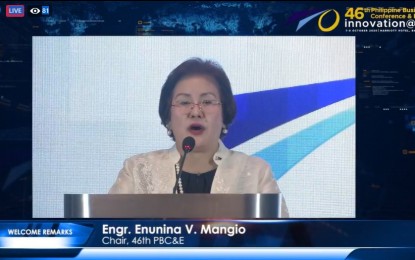
PBC RESOLUTIONS. Philippine Business Conference (PBC) chairperson Enunina Mangio presents the resolutions of the Philippine Chamber of Commerce and Industry's (PCCI) 46th PBC on Thursday (Oct. 8, 2020). The PCCI submitted the annual resolutions to President Rodrigo Duterte. (Screengrab from Facebook live of PCCI)
MANILA – The Philippine Chamber of Commerce and Industry (PCCI), the country’s largest business organization, on Thursday submitted its annual Philippine Business Conference (PBC) resolutions to President Rodrigo Duterte.
At the closing ceremony of the 46th PBC, its chairperson Enunina Mangio said this year’s resolutions urge the government to provide longer-term of fiscal and non-fiscal incentives, accelerating automation and digitalization of government procedures, and providing input subsidies to agriculture and aquaculture sectors as well as access to research and development technologies.
“These resolutions anchored on our drive towards innovation contain doable recommendations, proposed legislations and executive actions to enhance country’s economy and address the supply-side constraints and bottlenecks that will renovate our economy and drive our economic growth and development post-pandemic,” Mangio said.
Fiscal and non-fiscal support
Under its proposal to give longer-term incentives that will ensure revival of the economy and recovery of businesses and employment, the PCCI asked the Department of Finance (DOF), the Bangko Sentral ng Pilipinas (BSP), the Bankers Association of the Philippines (BAP), and the Department of Trade and Industry (DTI) to adopt financial measures that will directly impact micro, small and medium enterprises (MSMEs).
Under this proposal, the group asked banks and microfinancing institutions (MFIs) to open special loan windows for MSMEs where loan applications are being expedited and charging low interest rates.
PCCI also appealed to the BSP and BAP to suspend loan amortization without penalties or restructure loans without additional interest and/or postponement of mortgage foreclosures for defaulting borrowers.
They want an extension of more than six months for the amortization of outstanding loans of MSMEs until they survive and recover, and also asking the Land Bank of the Philippines and the Development Bank of the Philippines to restructure their loan terms and maturity dates of loans extended to MFIs allowing them to grant credit assistance to micro enterprises especially those engaged in retail enterprises and services.
For the national and local governments, the business group said they have to refrain from imposing new requirements to corporations and individuals until they recover from the impacts of Covid-19. They likewise ask to relax assessment fees and simplify requirements for business permits approval.
Automation, digitalization
As the Covid-19 pandemic accelerated the utilization of digital platforms, PCCI asked the national government to fast-track automation and digitalization among government offices by ensuring them that they are complying to the Ease of Doing Business Law.
PCCI likewise urged the Department of Information and Communications Technology and the National Telecommunications Commission to exercise their oversight functions in ensuring telco players provide and deliver better services at an affordable price and to mandate the common use of facilities and impose appropriate sanctions for non-complying telcos.
Agri, aquaculture subsidies, access to R&D
The PCCI highlighted the need for the government to ensure stable supply of food in the country amid the pandemic.
“[P]rovide technical and financial support and stable supply of raw materials to agricultural workers to improve their production outputs and to provide a buffer zone where farmers can bring their harvests for all seasons to be processed into long shelf-life finished goods,” PCCI proposes to the Department of Agriculture (DA).
The business group suggested to DA, local government units, and barangays to support and promote urban farming through converting idle lands and parks into vegetable plots that can be tilled by unemployed and marginalized, particularly members of the Pantawid Pamilyang Pilipino Program (4Ps).
They urged DA to allot 40 percent of the Agri-Agra credit facilities for business startups and support for local enterprises that complement fishers’ income.
They also want the DA to engage with the Department of Science and Technology and other research and development institutions to do focused research on Philippine aquaculture such as plant-based feeds, better protection from diseases, and better ecological fits and adaptation to Philippine coastal and upland ecosystem.
Lastly, the PCCI urged DA to prioritize the development of strategic areas with broader availability of raw materials and encouraged local government units in the rural areas to buy products from local farmers and fisher folks. (PNA)
